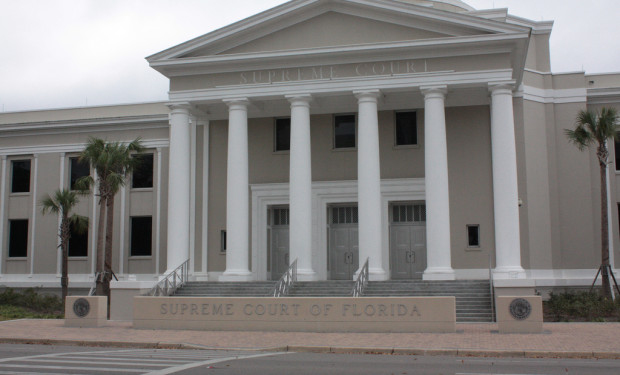Florida judge disbarred after secret relationship with prosecutor
The presiding judge and lead prosecutor established a “personal and emotional relationship” during the course of a capital murder trial.
On Friday, March 23, 2007, the lead prosecutor and the presiding judge presiding in a Broward County, Florida capital murder case encountered each other at a restaurant during the trial. Later they also met others at a bar after dinner. That was just four days before the jury found the defendant guilty of first-degree murder.
In the six months that passed between their first restaurant meeting and the judge handing down a death sentence, 949 cell phone calls and 471 text messages were exchanged by the Judge Ana Gardiner and Assistant State Attorney Howard Scheinberg. Forty-four of those communications occurred on the day before, the day of, and the day after sentencing. During that time, their extensive communications were personal in nature and did not pertain to the case at hand. Gardiner and Scheinberg did not disclose those communications to the defense.
The judge “failed to disclose the honest and true nature of her relationship.”
In November 2008, the Judicial Qualifications Commission (JQC) began investigating the matter. In her testimony to the JQC panel, the Gardiner “failed to disclose the honest and true nature of her relationship” with Scheinberg. The JQC referee found that Gardiner deliberately acted with “dishonesty and deceitfulness” when she failed to tell the JQC about her relationship. A special prosecutor was brought in to investigate the matter in April 2009. At that time Gardiner “acknowledged for the first time her ongoing emotional relationship” with Scheinberg. In 2010, Gardiner resigned from the bench after eleven years of service.
The defendant got a new trial after Gardiner and Scheinberg’s relationship was revealed, due to the need to “dispel any public misconception that there was any denial of due process.” His death sentence was reduced to life in prison.
On June 20, 2013, the Supreme Court of Florida found Scheinberg guilty of professional misconduct. He violated Rule 4-8.4(d), which provides that a lawyer shall not “engage in conduct in connection with the practice of law that is prejudicial to the administration of justice.” A witness testified that but for the contact, there would have been no need for a new trial. The court held that his misconduct called for more than the recommended one-year suspension. The numerous personal communications “served to damage the perception of judicial impartiality.” The court concluded that the Scheinberg’s “serious misconduct in this case warrants a two-year suspension from the practice of law in Florida.”
Florida Supreme Court disbarred the former circuit judge despite overwhelming testimony as to her good character and reputation.
In the case against Gardiner, the Supreme Court of Florida acknowledged the JQC’s findings that the judge (1) had no prior disciplinary record, (2) showed significant personal or emotional problems, (3) testified freely and openly, and cooperated in the disciplinary proceedings, (4) showed good character and has a good reputation, (5) was suffering from clinical depression at the time of the circumstances involved in the instant case, (6) was already imposed other penalties or sanctions; and (7) demonstrated remorse in her testimony and courtroom admissions. Yet on June 5, 2014, the Supreme Court of Florida disbarred the former circuit judge despite overwhelming testimony as to her good character and reputation. Gardiner’s conduct was found to be more serious because she had engaged in multiple offenses, and had substantial experience in the practice of law. She violated Rule 3-4.3 (the commission by a lawyer of any act that is unlawful or contrary to honesty and justice may constitute a cause for discipline), Rule 4–8.4(c) (a lawyer shall not engage in conduct involving dishonesty, fraud, deceit, or misrepresentation), and Rule 4–8.4(d) (a lawyer shall not engage in conduct in connection with the practice of law that is prejudicial to the administration of justice).
As a result, all seven of the justices voted to penalize the judge more severely than a hearing officer’s recommended one-year suspension. The court reasoned that “[c]onsidering [the judge’s] dishonest conduct and the harm that her actions have caused to the administration on justice in a capital first-degree murder case, we conclude that disbarment is the appropriate sanction.” Gardiner was also ordered to pay $8,117.18 in recovery costs to The Florida Bar.




